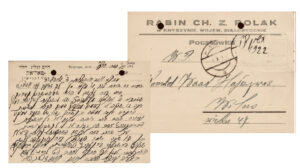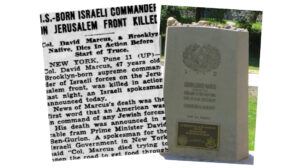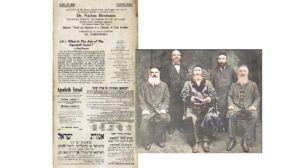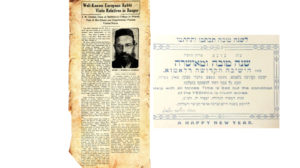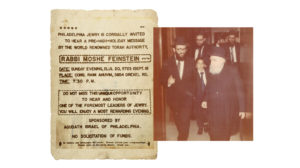When the Wall Came Tumbling Down

O
n the night of November 9, 1989, 15-year-old David Kern sat in his childhood home on the Ackerstrasse in East Berlin. There was a stir in the streets, a foreign wind twisting through the avenues. The Wall was coming down, and David was stuck at home.
His mother, a daughter of Holocaust survivors who moved to Germany after the war to participate in the building of a new socialist utopia, wouldn’t let him out the door. Too dangerous, she said.
The next morning, he went to school, but not many kids had shown up. After a while, those present agreed: Let’s go to the Wall.
And so they started walking, joined by thousands of others, toward an unknown future. Since the end of World War II, the wall had represented the decadent, bourgeoisie West — the enemy. Now, in those first stirring moments of freedom, the tall, gray concrete wall became the symbol of something very different: a gateway to the outside world and an invitation to a new life.
For David, those first steps would also represent a journey back to himself and a life of Torah. Looking back, 25 years after the fall of the Berlin Wall, David can now see the bigger picture, what the fall of Communism meant then, and what the monumental event could tell us about the future.
“When you witness an entire system cease to exist from one moment to the next,” Kern said in an interview from his London home, “it gives you an indication of the rapid transformations we will experience with Mashiach’s arrival.”
Today, David is a rabbi and avreich living in England with his wife Rebecca and seven children. But those days of revolution and collapse are never far from his mind. That Communism, a system so dominant and imposing, could collapse in an instant, is still a wonder to those who experienced it. This is David’s story.
A Utopian Dream
My grandparents were born and raised in Vienna. After the Anschluss [Nazi Germany’s annexation of Austria in March 1938] many of Austria’s Jewish children, including my grandparents, were able to immigrate to London with the Kindertransport. All they were able to take along was a single suitcase and their memories; they left their families behind. In England, these children created families of their own — forming groups among themselves and sticking together. Their hatred of Hitler and his cohorts caused them to look upon the Allies as their role models. While some chose the United States and capitalism as their future, others took favor with the Soviet Union and wanted to help build a worker’s paradise. My grandparents joined a socialist group dreaming of a better world with a society where all are equal.
They lost most of their family members in the Holocaust at the hands of the Germans. Yet after the war, when East Germany showed signs of becoming a part of this “New World” of their dreams, they wanted to participate in the utopia, and chose to live there. The move to Germany was a price they were willing to pay. What they saw was a political vacuum, where something perfect could be created without a revolution or violence. They truly believed in the socialist cause.
My parents on the other hand, still valued the socialist idea, but never actively participated in the political debate. They brought me up to keep an open mind and think for myself. The most important messages I got over and over again was “be a good person” and “do not live for yourself, always be there for others.” The indoctrination into the socialist ideology came from school, where it was preached extensively.
I grew up at the height of the Cold War on the very border between East and West. Living in Berlin, you felt as though you were standing on stage with the [Iron] Curtain having fallen right within your city! In school we were taught that the West aimed to conquer the entire world and destroy all those who do not think like them. There was a tangible fear of nuclear destruction befalling us at any given moment. This was not simply propaganda but the reality we all lived with, on both sides of the border.
Yet the message that I continued getting from home — to think for myself and never take what I am told at face value — truly penetrated, even at a young age. A particular scene stands out in my mind. I was all but six or seven years old and was traveling somewhere with my mother. Standing on the platform of a busy train station, I turned to her and asked: “What if it turns out that we got it all wrong? What if they — those on the other side of the Wall— are the ones who are right? How are we to know who is truly justified here?”
I was very lucky that I was able to voice such thoughts to my parents. My friends later admitted to having been jealous of me. “You were always allowed to voice your opinions,” they said. “Our parents didn’t permit it, out of fear of repercussions.”
This open-mindedness is what eventually led me to become interested in Torah-true Judaism. That, in turn, brought me to yeshivah and the life I lead today.
Looking West
While in Soviet countries people stood in line for three blocks waiting to obtain a piece of butter, we did not see such scenarios. I never felt deprived as a child, since the economy in East Berlin wasn’t nearly as bad as that in the Soviet Union or even rest of the DDR — the Deutsche Demokratische Republik [German Democratic Republic]. Needless to say, we were keenly aware that the West was light years ahead of us in terms of choices of consumption and entertainment. Although strictly illegal, we managed to catch some Western radio, and often listened to the BBC and American and West German news, and thus were kept up to date on the goings-on the other side of the Wall.
Travel was extremely controlled. It was not easy to obtain permission to leave the DDR for something as simple as a vacation in the West. Only if the government felt that the people applying for a visa were trustworthy and would return home were they granted visas. My grandparents, who worked in the field of academia, regularly took work-related trips to the West. My parents, on the other hand, were not as privileged, and were only given travel permits on rare occasions.
These restrictions caused great discontent, which in turn triggered much resistance and progressively louder demonstrations.
Tenuous Connections
My grandparents had been hunted by the Nazis and lost most of their relatives in the camps. Their generation of Jews lived under the motto of “out of many victims, we are a few survivors,” a phrase that helped shape our identity.
We grew up with an acute awareness of being Jewish, knowing that we were part of a global Jewish People, with a generations-old story tracing back several millennia, that was the foundation of our spiritual life and essence. This held particular significance because we were living in Germany. Every Jew had a different reason for living there. While some got stuck waiting for answers from the Red Cross about lost loved ones, others had spent time in the displaced persons camps within Germany and did not know where to go, or found a good source of income. Everyone stayed virtually “sitting on their suitcases.” And then there were those, like my grandparents, who came to Germany in their search of a new and better world.
I was not aware of it as a child, but looking back, I realize that all our friends and acquaintances were Jewish. There was such a strong bond between us over there, that even my pediatrician — who, unbeknownst to us, was Jewish — used to shower me with grandmotherly love at each visit, making doctor visits something I came to look forward to. It was only years later when I visited the Jewish cemetery in Berlin that I found her gravestone and then realized why my family had received special treatment from her.
The common identity and affiliation instilled within us a certain pride and represented something inexplicably mysterious. This piqued my interest, and I wanted to understand what it was that connected us to so many Jews all over the globe, and why we were still here after all the persecution we had suffered. Yet I had little to quench this curiosity.
Our entire Jewish infrastructure consisted of one kosher butcher shop, supplied by a shochet from Budapest who would come once a month to slaughter a few cows. The matzos we received from Hungary were a rectangular shape I have never seen since! We had these few Jewish traditions, but we often lacked a true understanding for them.
This slowly changed in the mid-1980s when a rabbi from Eretz Yisrael started coming for regular visits. Each time Rav Weinmann arrived, he would bring along a suitcase full of treasures: siddurim, matzos, etc. He even came to make Pesach Seder with us once. He was the first person who conveyed authentic Yiddishkeit and was a major source of inspiration and information for me. The fact that he came for no other reason but purely out of care for his fellow Jewish brethren left a big impression. We had not been abandoned and forgotten!
I started visiting shul, which was located in the courtyard of an empty building on Rykestrasse 53. I remember standing across the street on Friday night and looking up at this majestic red brick house, with ornaments on the façade, wondering, Why is this building empty? What was it used for in the past? Only years later, when I became a rebbi in the yeshivah housed in this very building, did I learn that it had housed a Jewish school before the Holocaust.
The Fateful Day
In the weeks before the fall of the Berlin Wall, the demonstrations increased and there was extensive police presence at each of these gatherings. No one knew how far they could dare go; the fear of repercussions was still there. While people were fed up with the system then in place, it was every parent’s nightmare to allow their children - the core of the demonstrating crowd — to go to the border. My mother did not allow me to go anywhere near the Wall.
I’ll never forget that Thursday night, November the 9th, when my mother told me about Schabowski’s announcement [see sidebar]. She warned me that something big was happening. Not knowing what was still to come, she asked me stay put.
She and others shared the fear that the USSR would react as it had in October 1956, when the people of Hungary rose up against Communist rule in Budapest. Would Soviet tanks start rolling down Berlin streets? No one knew. But the excitement I felt was indescribable. I knew in my heart that only good could come now.
While I stayed home, all night long people streamed toward the border crossings, climbing the walls, breaking holes into the concrete and embracing West Berliners. Within hours all the crossings had been opened. With laughter and tears the people poured into West Berlin, breathing free air for the first time in decades.
It was only the next morning that I joined the few classmates who decided to show up in school and started heading toward the Wall.
I walked down the street and instead of needing to stop midway and turn back because of the barrier, I suddenly found myself on the other side of the border, continuing down the street with the very same name! How great the significance this simple walk held for me. While for many the excitement was in tasting Coca-Cola for the first time, my happiness came from a different place. The magnitude lay in the totally forbidden now becoming the new normal. To be able to do something as seemingly minor as to sit on a bus or the subway! — that to me was extraordinary. I felt like a new life stood unlocked before me.
It was much later, when I had time to reflect on the deeper elements of these events, that its effect became clear. Until then the Wall seemed to be something that would still be standing 100 years from now and suddenly, without forewarning, it was gone. With this I came to realize how our own human barriers and borders can also be torn down, that a person is only as limited as the boundaries he sets and accepts for himself. But I slowly realized that there must be more to life than what we see before us.
This is what molded me into the person I am today — not to regard things as one-dimensional, to discover hidden depths, which is the essence of Torah study. I understood that in the world we live in, all that we observe just serves as a façade behind which one must invest time and effort to search for the path to actual truth. None of us wakes up in the morning and crosses the street feeling immediately overwhelmed by the all-embracing divine G-dliness. We must put in much effort to discover, understand, and feel it!
Now What?
Once the Wall fell, it became obvious that East and West Germany would join together into a reunified country.
For us Jews this new chapter caused an identity crisis. We had no idea what the unification would bring, some even fearing the return of nationalism. Slowly we came to realize that the fears were unfounded.
For Jews who consciously chose to live in Germany because of their deep faith in the socialist system, these radical changes were a true catastrophe. Slowly they tried to come to terms with the fact that their entire lives’ work was no more. They admitted to having made many mistakes, but continued to believe in the necessary fight against injustice and inequality in society.
Soon after that a Rabbi Dovid Marlow from England started coming to Berlin on regular visits to encourage us in our Yiddishkeit. He was a very caring person with whom I immediately felt a connection. He invited me to come and live with his family and learn Torah in England, which I did right after high school. For the first time I had the opportunity to live within an established Jewish community and observe their way of life. From there I traveled on to Israel, where I spent six years in yeshivah, and after my wedding, another three years in kollel.
In the year 2000, with the support of the Ronald S. Lauder Foundation, Rabbi Josh Spinner opened a yeshivah for mostly young Russian Jewry in Berlin. He offered me the job as the first full-time employee at the yeshivah. I approached Rav Shlomo Wolbe about this opportunity. “I am a former Berliner myself!” he said, and gave me a brachah to be matzliach there, as well as much hadrachah and advice for the work awaiting me. My family and I stayed in Berlin for three years while I taught in the yeshivah.
What held powerful significance for me was the location of the school. The front building on Rykestrasse 53 — the same building that had stood so empty when I was a teenager — had come full circle, once again serving as a house of Torah learning, as it had before World War II.
While the yeshivah continued to grow, I moved my family to Amsterdam in search of better chinuch opportunities for my children. We lived there for two years, while I learned in the Kollel Chacham Tzvi. Once again I was called back to Berlin to help reestablish the former Hildesheimer Yeshivah, also known as the “Rabbinerseminar zu Berlin,” which trains young men to become rabbanim. I also taught younger students at the yeshivah and at the midrashah for girls.
As my children continued growing older, the need for a more established chinuch system became necessary. Four years ago we once again packed our bags, this time heading to London. Today we live in Edgware, where I study in Kollel Beis Aharon, a first-class kollel led by Dayan Ehrentreu. The intense atmosphere with a focus on gadlus baTorah is truly inspirational. In the evenings I teach at the Edgware Beis, a learning program for students and young professionals. I also teach Gemara and its methodology to businessmen. My desire remains to continue to learn and teach Torah as much as possible.
It is not often that we realize the significance of a Higher Power in our lives; it is a true inspiration when one sees miraculous change happen in front of one’s own eyes. I see it as a major zechus for me that I witnessed, and continue to be part of, a momentous time for our people.
(Originally featured in Mishpacha, Issue 533)
Oops! We could not locate your form.

